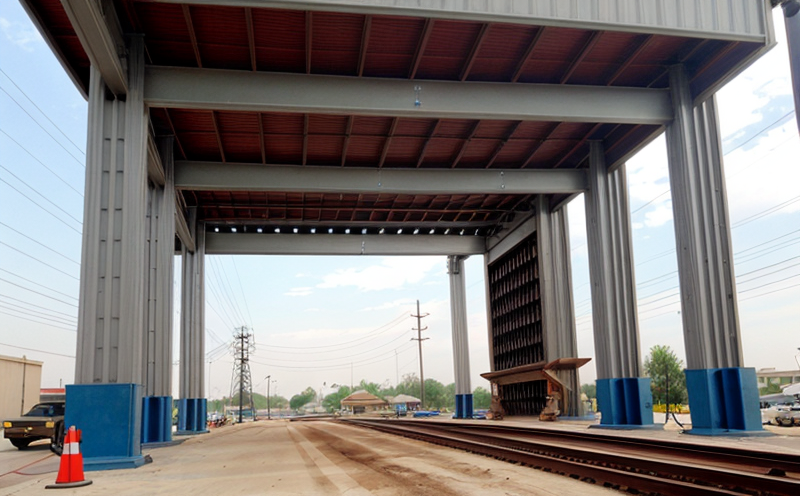EN 2597 Structural Fatigue Testing of Aircraft Components
The European standard EN 2597 is specifically designed to assess the fatigue properties of structural components used in aircraft and aerospace applications. This testing method plays a crucial role in ensuring that materials and structures can withstand repeated loading cycles without failure, thereby enhancing safety and reliability.
EN 2597 emphasizes controlled cyclic loading at specified frequencies and amplitudes to simulate real-world operational conditions. The primary focus is on identifying the fatigue limit or endurance limit of components under various stresses. This process involves precise control over environmental factors such as temperature, humidity, and atmospheric pressure, which are critical for accurate results.
The testing procedure typically starts with specimen preparation, where samples are machined from larger parts according to detailed specifications provided in EN 2597. These specimens undergo rigorous inspection using non-destructive testing (NDT) methods like ultrasonic testing or radiography before being subjected to cyclic loading.
During the test, strain gauges or other displacement sensors measure deformation and stress distribution across different sections of the specimen. The data collected during these cycles is analyzed statistically to determine the number of cycles-to-failure. This information helps engineers design more durable structures by understanding material behavior under fatigue conditions.
For compliance with EN 2597, it's essential that laboratories adhere strictly to its requirements regarding environmental control, equipment calibration, and operator training. Compliance officers should ensure their facilities meet these standards to avoid costly delays or rejections during certification processes.
In addition to structural integrity, fatigue testing also provides insights into material properties such as yield strength, tensile strength, ductility, and resilience. These parameters are vital for selecting appropriate materials for specific applications within the aerospace industry.
Understanding EN 2597's requirements not only aids in meeting regulatory demands but also supports continuous improvement efforts aimed at enhancing product quality and reducing maintenance costs over time.
Industry Applications
| Component Type | Testing Requirements per EN 2597 |
|---|---|
| Fuselage Spar Caps | Must demonstrate resistance to low-cycle fatigue under torsional loads. |
| Wing Spar Beams | Need to withstand high-cycle fatigue due to aerodynamic forces. |
| Tail Ribs | Aim for maximum endurance limit against cyclic bending stress. |
| Engine Mounts | Ensure they can handle extreme dynamic loads without failure. |
| Flight Control Surfaces | Demonstrate robustness under frequent but less severe loading patterns. |
The aerospace industry relies heavily on EN 2597 for ensuring the safety and longevity of its products. By adhering to this standard, manufacturers can produce reliable parts that meet stringent performance criteria demanded by both regulatory bodies and end users alike.
Eurolab Advantages
At Eurolab, we offer comprehensive EN 2597 fatigue testing services tailored to the unique needs of the aerospace sector. Our state-of-the-art facilities equipped with advanced testing machines allow us to provide accurate and reliable results consistently.
We employ experienced professionals who are well-versed in all aspects of EN 2597 compliance, ensuring that every aspect of your project is handled correctly from start to finish. From specimen preparation to final reporting, our team ensures precision and consistency throughout the entire process.
Our commitment to quality extends beyond just meeting standards like EN 2597; we strive for excellence in all areas of our operations. This includes providing timely turnaround times without compromising on accuracy or reliability, which is especially important when dealing with tight deadlines associated with aerospace projects.
In addition to standard testing services, Eurolab also offers customized solutions based on specific client requirements. Whether you need assistance selecting the right specimens for your tests or require specialized equipment not covered by EN 2597, our team can help tailor a solution that meets your unique needs.
Quality and Reliability Assurance
To ensure high-quality results in EN 2597 fatigue testing, Eurolab adheres strictly to international standards such as ISO/IEC 17025. This accreditation guarantees that our laboratory practices meet the highest levels of proficiency and reliability.
Our quality management system is designed around continuous improvement principles, ensuring that we stay up-to-date with any changes or updates to EN 2597 or related standards. Regular internal audits coupled with external reviews by independent bodies further reinforce our commitment to maintaining top-notch quality standards.
We employ stringent quality control measures at every stage of the testing process—from initial sample preparation through final analysis and reporting. This includes thorough documentation practices that trace each specimen's journey from acquisition to destruction, providing transparency and accountability throughout the entire procedure.
In addition, Eurolab invests heavily in ongoing staff development programs aimed at enhancing technical skills among our personnel. By fostering a culture of learning and innovation within our organization, we ensure that our professionals are always ahead of industry trends and best practices.





